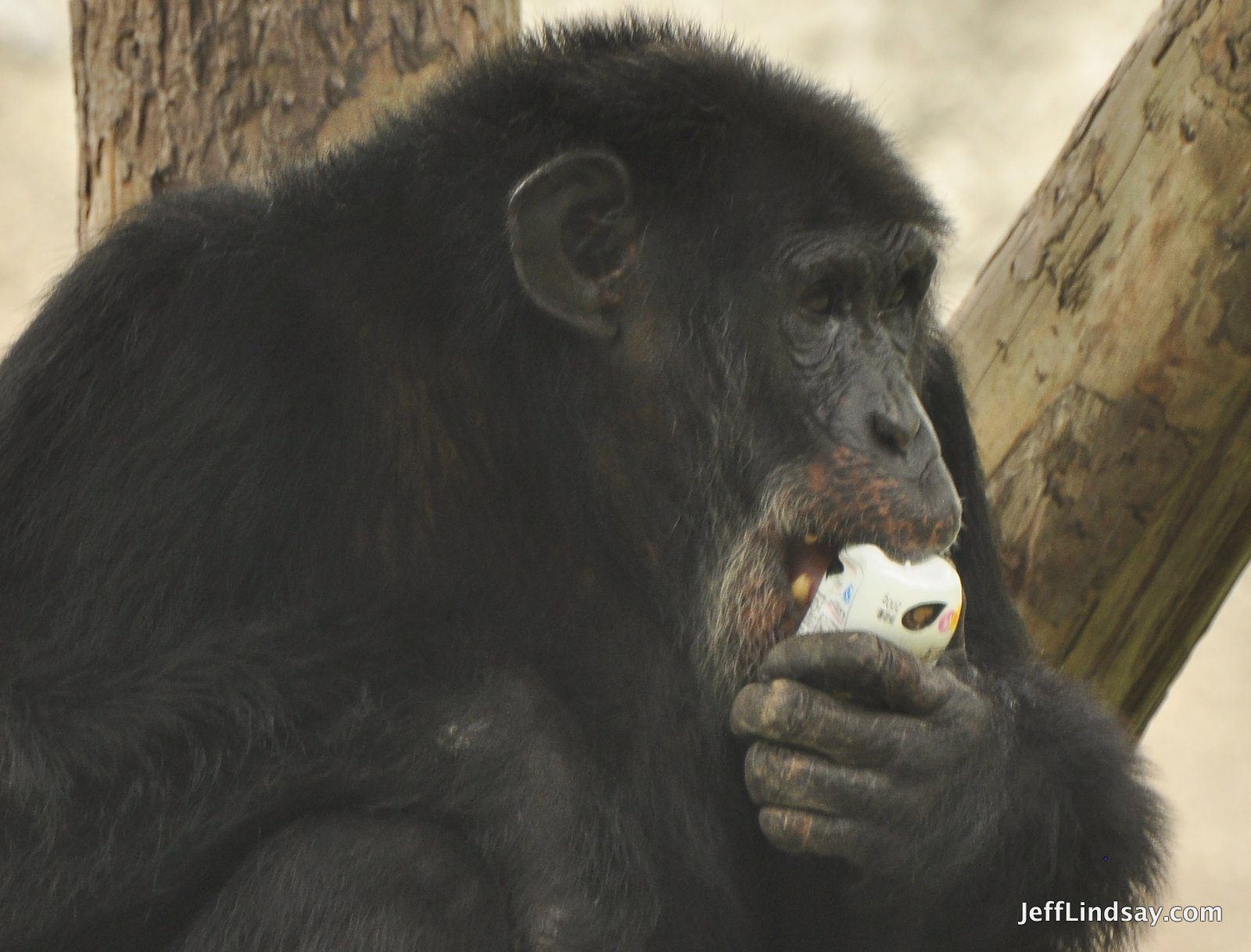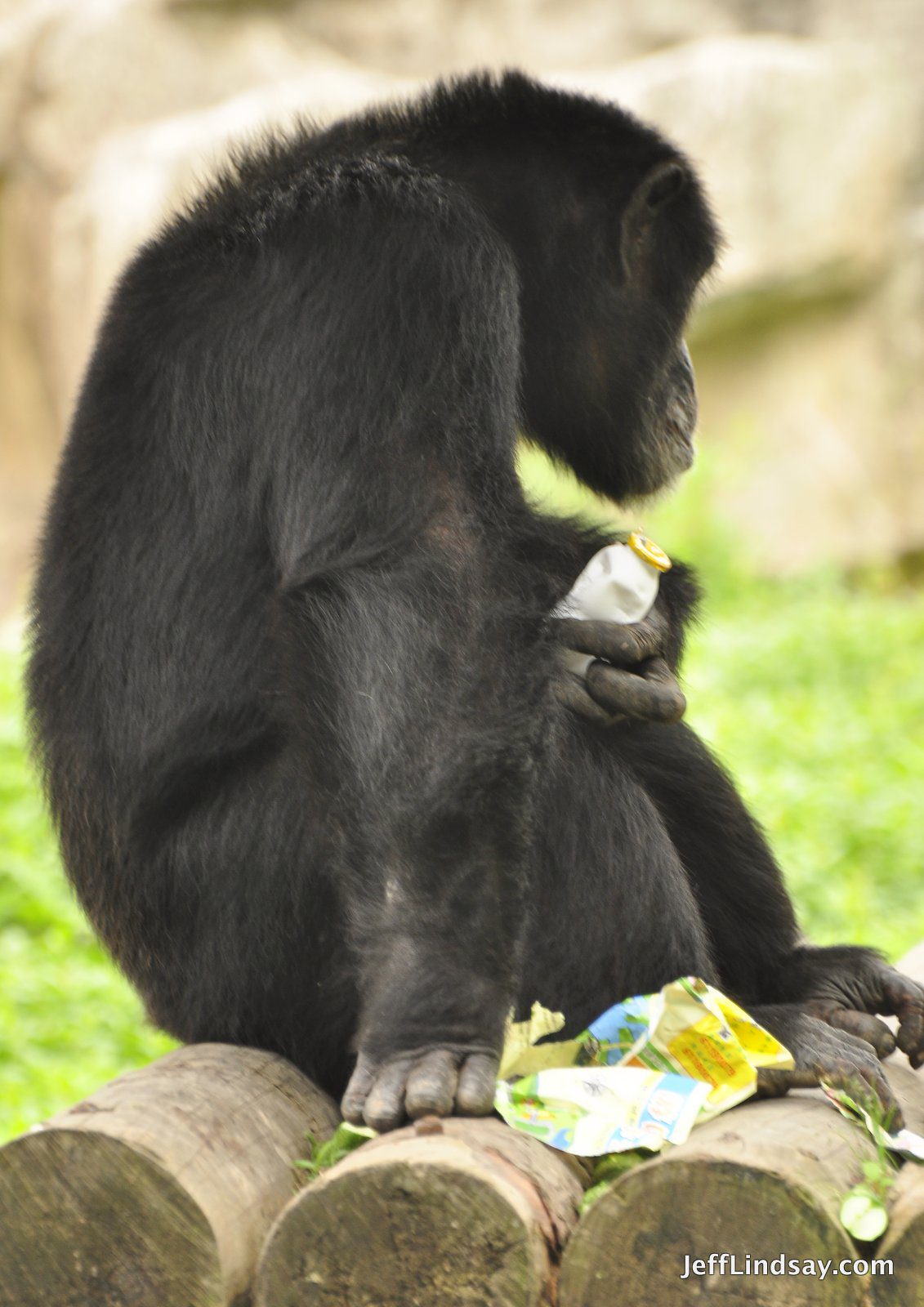A Time to Speak Out
As a stranger and guest in China, I’ve tried very hard to not make a fuss and generally just quietly accept the way (or rather, the many ways) people do things here. I don’t want to offend or ruffle feathers. Trying to be a good and humble visitor has meant biting my lip on many occasions. Today, though, I couldn’t keep quiet and chewed out someone. Actually two different parties on two occasions for the same offense. And it felt great, though difficult and awkward. It felt and seemed like the right thing and I could see others were glad someone spoke up.
We were at the Wild Animal Park in southern Shanghai, a large sprawling complex with wild animals you can view from a bus that goes into their territory. It also has more traditional zoo displays you walk around, along with numerous signs warning people not to feed the animals. While watching a large chimpanzee in his somewhat natural area, I was astonished to see that he was attempting to eat an aluminum can that someone had thrown to him. Then I noticed a pile of food packaging garbage in front of him, and lots of plastic bottles on the grass and in the water of the moat around his area. Then, to my shock, I saw another bottle go flying over the moat into the grass near the chimp. I looked over at the young man, maybe 22 years old, who had thrown it, and sensed that he was getting ready to throw more. At this point, I dropped my “ambassador of niceness” pose and spoke out.
I walked over to him and in a loud voice, heard by several dozen people, I gave this lecture in Chinese, drawing upon several recent additions to my vocabulary: “Hey, don’t throw garbage in there. That’s unacceptable. It can hurt and kill the animals. This is uncivilized behavior and I really can’t stand it. We need to show respect for natural (sic! here I used the wrong word, “natural” instead of “nature,” but he seemed to understand). I’m sorry about this, but I have to say something.” The young man was surprised, maybe shocked, especially to get a lecture from a foreigner, but was respectful and looked very embarrassed at what he had done. I think he understood. It felt great to get that off my chest. An older man nodded vigorously and thanked me as I laid into the garbage flinger, and I could see others were grateful that someone, finally, had said something. But why did it have to be a foreigner? I am glad, however, that I was not alone.
The Chinese people are hard to figure out. The longer I stay here, the less I understand (in some ways). Of course, there is no one “Chinese people.” In the people and its many diverse individuals, there are layers upon layers with complex relationships, apparent contradictions, and a multitude of attitudes, paradigms, traditions, and behaviors that require a great deal of effort, patience, and respect to understand. In this case and in many public settings, the Chinese people often endure problems and even misbehavior from others with patience and politeness, sometimes I think too much politeness, when many would like to say something like, “Hey, could you please go outside to smoke?” or “Excuse me, but could you stand on the right side of the escalator so the rest of us can walk on the left side?” or “What kind of idiot are you throwing garbage at a beautiful animal in the zoo?” Other times they are feisty and outspoken and some of them seem way too loud and outspoken for my tastes. For the future, I hope speaking out against blatantly bad behavior at the zoo won’t be left to strange foreigners.
Here’s the chimp (click to enlarge). That’s an aluminum can in the first photo and, moments later, a plastic bottle in the second.
A few minutes later at an alligator exhibit, I saw an apparently wealthy man and his wife or girlfriend throw in a chicken sandwich wrapped in foil and plastic, trying to hit a resting crocodile and stir up a little action. Somehow I just didn’t want to cause trouble again, but I could see that the woman was preparing to throw in another a sandwich or hamburger in a plastic bag and felt once again that I couldn’t just stand there, so I quickly went over and gave a shorter version of the lecture: “Hey, that’s unacceptable. That garbage is unhealthy and can kill the animals. Don’t do that.” She nodded and seemed to get it, but I hung around a little longer because I didn’t trust her and her friend or friends. They noticed I was watching and resisted the impulse to throw stuff at the animals.
Many foreigners have observed that people throwing food and garbage to the animals in Chinese zoos is an outrage that needs to be stopped. I wish the authorities would pay attention to this problem more thoroughly. (Tip: A few garbage flingers dragged away in handcuffs and shown on the evening news would really help! Word travels fast in China.) I hope the people I lectured today and those who heard the lectures will think more carefully in the future and help others to know that abusing animals like that is bad for the animals, bad for nature and ugly for China.
Bitter Failure on Mission Street
It felt good to speak out, awkward as it was. As glad as I was to have done something that felt right, it also stirred up one of the most painful memories in my life, a time when I should have spoken out in the midst of another crowd but was too afraid. (For those very few of you who put me on a pedestal because I’m an LDS apologist of something, you can skip my embarrassing revelation below and just click on the donation button at the right instead.) This was many years ago when I was in San Francisco on a business trip. It was the night before I was to give an important presentation at a large conference as a representative of my employer. I had a little time and thought I would walk along famous Mission Street around the corner from my hotel to see what was there. I soon heard and saw a group of maybe four very tough looking men, a gang I think, following a severely overweight woman and mocking her cruelly. Hundreds of people where there on this crowded street, observing this abuse and doing nothing. Nothing. Not a word. Not a sign of courage. Is that how my nation has become?
I scanned the crowd walking nearby to see if anyone shared my concern and outrage, and felt totally alone in that bustling, indifferent mass of humanity. I suspected that if anyone was going to help, it had to be me, but I couldn’t get my fear out of my head, and specifically fear of someone in management: “You couldn’t speak at the conference why? What were you doing getting into trouble and getting beaten up in a rough city like that? Why were you out on the street at night? How irresponsible! And what happened to your nose?” A ridiculous, selfish, petty concern, but that was the fear going through my head, almost more severe than the fear of being physically hurt. I tried to come up with some safe way of helping, gradually trying to stand between them and the girl and maybe slow them down or something, maybe distract them, but what was needed was quick and courageous action. Merely yelling a simple, “Hey, leave her alone!” might have been all that was needed, some voice to let that poor woman know that someone cared and that she was not as alone and rejected as she felt. Maybe there were a dozen others like me who would have been thrilled to find someone give them courage to also speak out. But I kept us all separated and alone, silenced with indecision and fear. Is that how my nation has become? Or was it just how I became?
I was trying to find a way to help that wouldn’t get me hurt or in trouble, but before I could crawl out of my foxhole to take any kind of action, the gang took a turn down some other street to find some new victims to torture, and a lonely hurting woman returned home alone and in pain. I saw the pain on her face for a moment. I will not forget it. It’s a memory of failure that haunts me to this day. One of many sins and mistakes in my life, but one that I count among my most painful failures. There are many other failures and perhaps many that should be causing me more shame than that memory, but that sin of omission on the ironically named Mission Street is one I can’t and don’t want to forget.
What a chance that was to make a difference and show a little faith and charity, but I did nothing. Worthless. May I be prepared and more faithful the next time it’s my turn to speak out.
Yes, I have sought to repent and believe that the grace of Christ has washed that sin away, like many others. I also hope and pray that the Lord was able to help that woman who needed but didn’t receive any help from me. I desperately hope she didn’t give up. I hope she overcame the pain inflicted that night and can forget. But I don’t want to forget it, I can’t just let it go, because there is a lesson about my weakness that I don’t want to overlook. I want to be stronger next time. Faster, more prepared, more willing to help. I don’t want to let fear stop me from doing what’s right as it has too many times. I hope I have learned from that failure, though I’m not completely sure. I’m actually still afraid of how I’ll handle the next unexpected challenge when I suddenly find myself feeling very alone and frightened in a crowd, or too concerned about my needs to even see that someone in front of me needs my voice. I hope we’ll all be more ready the next time someone needs our courage and help on our personal Mission Street.
Postscript: On the Other Hand…
Update, 6/13/2013: Writing this post also stirred up memories of yet another painful failure where speaking out in the face of opposition and pressure was precisely the wrong and stupid thing to do, deeply offending a well-meaning person over an issue where biting my lip and enduring something only slightly inappropriate (in my opinion) would have been best. I’ll share details some other time, maybe, but it is very easy to cross the line of righteous indignation and courage and to step into the mine fields of clumsy offense and unfair criticism. That’s sort of how a lot of feuds and wars get started, including the Mormon War of 1838 in Missouri, where there were faults on both sides leading to unnecessary conflict.
There are many ways inappropriate courage can be manifest. Imagine a would-be Messiah smashing the tables of money changers at the temple, but accidentally including a young child’s humanitarian aid fundraiser project in the mix. Or today, imagine someone whose sense of fairness for others leads them to condemn the Church and its leaders for its policies on marriage and the family without seeking to fully understand how people trying to be fair and compassionate can have a difference of opinion on such matters. Issues of social and religious policy are far more complex than the simple, blatant case of someone throwing trash to a chimp when the abundantly posted policies of the zoo forbid it. When we are outraged by a difference of opinion in such matters, before we condemn and especially before we point our finger and condemn in public, it may be wise to first seek to understand and learn from the other party, and, though we may still disagree, avoid hasty assumptions of stupidity and evil intent.
There is a time to speak out boldly and a time to be silent, patient, and generous. Life, of course, is complicated. This is where heart and mind both need to operate, and where we certainly should strive to seek the Lord’s guidance and listen to the Spirit.













Great tip to the authorities in China, Jeff. I hope they read it–but chances are they aren't reading your stuff as faithfully as the IRS, the NSA, the FBI, the CIA, and a dozen other agencies tracking every word you say, every dime you spend, every email and Twitter, every phone call, every purchase, to compile information about you, to track and predict your behavior, and to be ready to kick in the doors and haul you way when the time is right. Not now, of course, since you live in China, but when you set foot in this country, watch out.
Balance is the most difficult thing. Something that is brave and courageous with one set of facts can easily become boorish and cruel with another set of facts. We need to at least be thinking with courage, ready to stand when the time is right, but with the wisdom to know that some battles are not meant to be fought and some things just need quiet endurance. But at least let's think and be looking to do good rather than just ignoring and never thinking, always being sheep.
Why are you so hard on yourself? The four jerks on Mission Street were bad enough but did no violence to the woman. Weighing the risk of violence against yourself against the nonviolent abuse of the woman, I'd say you did the logical thing. Brain damage is worse than hurt feelings.
This comment has been removed by a blog administrator.
Thank you for sharing this. It's interesting to me that you used the phrase "this is unacceptable", which doesn't seem the first word an American would use. Maybe wrong, terrible, bad, etc. Is unacceptable what you would have said in English, or did it fit better with how the Chinese would have said it.
Mark Steele
Mark, I think I just used the phrase 不行. I also threw in "这种行为我受不了“